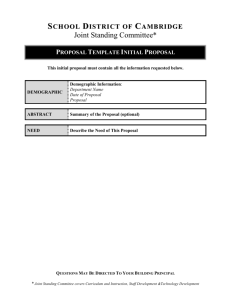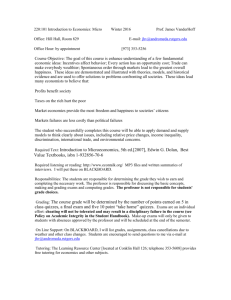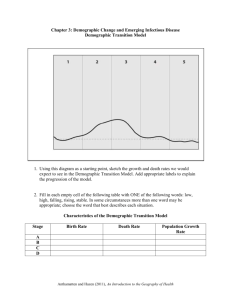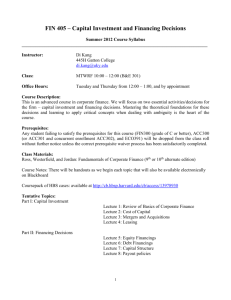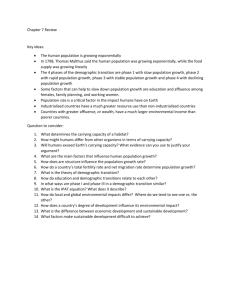Psychology 3500 - Wayne State University
advertisement
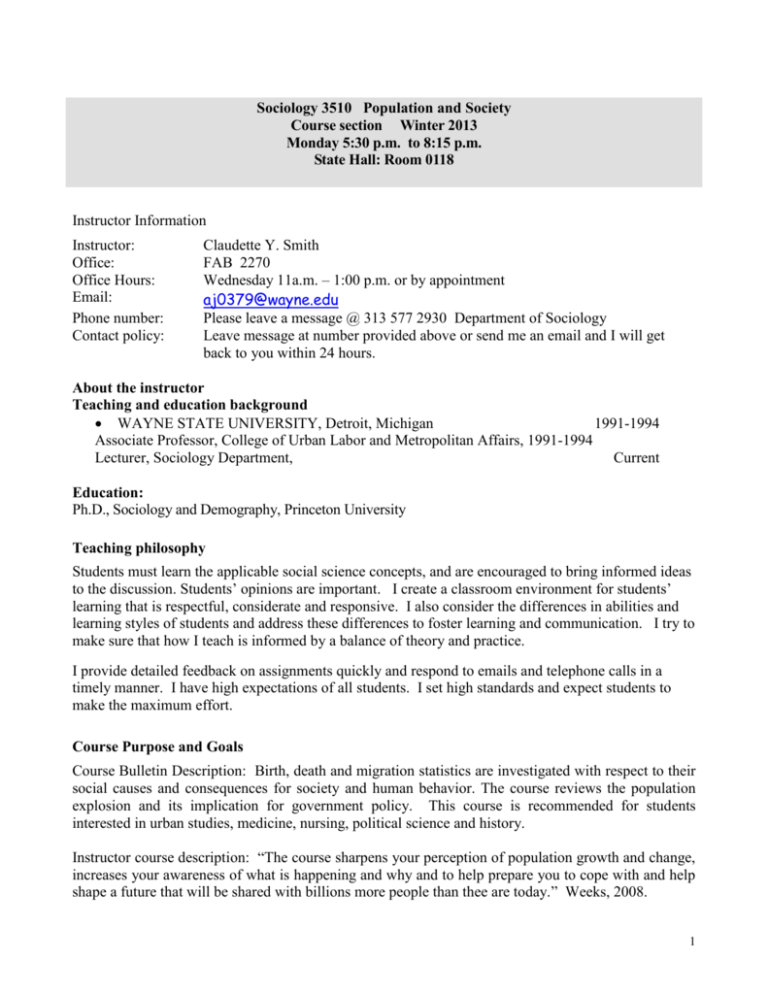
Sociology 3510 Population and Society Course section Winter 2013 Monday 5:30 p.m. to 8:15 p.m. State Hall: Room 0118 Instructor Information Instructor: Office: Office Hours: Email: Phone number: Contact policy: Claudette Y. Smith FAB 2270 Wednesday 11a.m. – 1:00 p.m. or by appointment aj0379@wayne.edu Please leave a message @ 313 577 2930 Department of Sociology Leave message at number provided above or send me an email and I will get back to you within 24 hours. About the instructor Teaching and education background WAYNE STATE UNIVERSITY, Detroit, Michigan 1991-1994 Associate Professor, College of Urban Labor and Metropolitan Affairs, 1991-1994 Lecturer, Sociology Department, Current Education: Ph.D., Sociology and Demography, Princeton University Teaching philosophy Students must learn the applicable social science concepts, and are encouraged to bring informed ideas to the discussion. Students’ opinions are important. I create a classroom environment for students’ learning that is respectful, considerate and responsive. I also consider the differences in abilities and learning styles of students and address these differences to foster learning and communication. I try to make sure that how I teach is informed by a balance of theory and practice. I provide detailed feedback on assignments quickly and respond to emails and telephone calls in a timely manner. I have high expectations of all students. I set high standards and expect students to make the maximum effort. Course Purpose and Goals Course Bulletin Description: Birth, death and migration statistics are investigated with respect to their social causes and consequences for society and human behavior. The course reviews the population explosion and its implication for government policy. This course is recommended for students interested in urban studies, medicine, nursing, political science and history. Instructor course description: “The course sharpens your perception of population growth and change, increases your awareness of what is happening and why and to help prepare you to cope with and help shape a future that will be shared with billions more people than thee are today.” Weeks, 2008. 1 The goal of the course is to introduce the student to the basic concepts of population studies. Students in this class come from a broad range of academic disciplines and backgrounds that enrich the learning experience in this course. Course objectives include: 1. Students are introduced to demographic concepts. 2. Students are introduced to the demography literature both classical theorists and current research. 3. Students can question, clarify and challenge concepts through full participation. 4. Encourage critical thinking in students. 5. Develop students’ interest in demography. Course Outcomes: Students learn demographic concepts and issues and its impact on a wide range of issues including economic, political and sociological. Students learn that demographic events influence everyone’s life. Through the Family Demographic Research Project, students apply the demographic concepts to their own families and are able to articulate the real effects of demographic change. Students will be successful in this class through good work ethic that is being diligent and consistent in their studies. It is important that students keep a steady pace in this course. Course Structure Delivery method: Course classes will be by lecture and discussion. Students are required to read the assigned course readings and come prepared with questions. Lecture outline and notes are provided in power point slides that are posted on Blackboard. Classes follow the text very closely. The course objective is to cover all pertinent sociological concepts that are essential in an introductory course. Students are expected to read course materials and come prepared to class to have a meaningful discussion on the concepts to be covered. Feedback: The course is organized on Blackboard (Bb) which can be accessed at: www.wayne.edu . You are required to use Blackboard. If you have any questions about how to use Bb, please contact Bb for student support. The syllabus and all course requirements are posted on Blackboard under the course. All communication on the course will be posted on Bb. You must check Bb daily for assignments and course information. Note that Bb uses your WSU account, which is the account that will be used to communicate with you. If you want to use another address, you should contact student support for Bb for assistance. Course assessment includes the following: Exams: There will be 3 exams administered in this course. Exam questions are based on the readings and lecture. Students are responsible for all the material in the text. Exams will consist of true /false, matching definitions and multiple choice questions. All exams are posted on Blackboard. Dates for the exams are posted on the schedule. Research Project: This project is a variation on the theme of tracing one's roots, which is a form of family reconstitution long familiar to historical demographers, but now a booming business, especially 2 on the internet. Students are charged with the task of placing their own family's demographic behavior in the context of the broader demographic and social trends taking place over time. Class Presentation: Class presentations are required in this course. Course Readings Required Text: Population, An Introduction to Concepts and Issues, Eleventh Edition, John R. Weeks, San Diego State University. Optional materials: The Longman Writer’s Companion for writing assistance. Class lectures follow the text closely. Students are expected to read the assigned chapters in the text prior to class. A schedule of readings for class is provided. Grades You can earn 644 – 714 points in this course. The grade you earn will be based on the total number of points you earn. Grades will be assigned according to the following schedule: Grade Range Grade A 90-100 B+ A- 85-89 B B- Range 80-84 Grade Range Grade Range C+ 65-69 D+ 50-54 75-79 70-74 C C- 60-64 55-59 D D- 45-49 40-45 Below 40 E Breakdown of points: You receive credit for all work that is completed in this course. You earn 564 614 points in the course. Points for each component of the course assessment and percent of final grade are: Three exams 300 - 350 points (45%) Pop Quizzes 80-100 points (10%) Attendance 14 points (10%) Research project 150 points (25%) Class Presentations 100 points (10%) Student Responsibilities Students are expected to manage their time such that they attend all classes. I must be notified should a student need to leave class early or come in late. Students are responsible for reading and understanding the syllabus requirements: All requirements of the course are posted in the syllabus on Blackboard. Students can make an appointment to meet with me should they have any questions that cannot be covered in class. Students are expected to understand and use Blackboard in this course. All exams are posted on Blackboard according to the schedule in the syllabus. You must have a University-approved excuse to miss an exam. See below for university policies. 3 Falling behind: It sometimes happens that students find themselves unable to keep up with the demands of the semester. If that happens to you, for whatever reason (family matters, personal issues, health, and so on), it is best to speak to me as early in the semester as possible. Don’t wait until the semester ends to seek assistance. Course Policies Attendance: There are 14 classes in this semester. Attendance is required, and will be recorded weekly for classes. However, if you do not attend class, it is your responsibility to find out what you missed, including any changes in the syllabus. The lecture outline is available in power point on the course website. If you miss class, you will need to rely on other students in the class to get copies of notes. Make-Up Exams Make-up exams MUST be arranged with me PRIOR TO the exam. Failure to complete the exam within the time period set will result in a score of ZERO on that exam. Incomplete: A grade of incomplete will be given in this course in only the most extreme and compelling of circumstances. Work not done or submitted too late will be graded as zero toward course grades. Other possibilities include: Late assignments/submissions: accepted only when discussed with the professor. I make every effort to ensure that students are notified when assignments are posted. It is your responsibility to check Blackboard daily for announcements on the course. Any changes will be discussed n class as well as posted on Blackboard and communicated by email. Reporting illness: send a message by email regarding your ill health to get excused absence from class in the case of ill health or that of child for whom you are the primary care giver. Unacceptable behavior in class: Students are expected to be respectful of each other and the instructor. I encourage a positive classroom environment in which all relevant ideas on the topic being discussed are welcome; an environment that provides all students with equal time and opportunity to express their opinions. University Policies You must have a University-approved excuse to miss an exam. These include: 1) You must attend a University-approved team, band, or orchestra function which occurs at the time of the exam (The same day is not sufficient unless you must travel out of town). You must let the instructor know of the event at least one week before the exam, and you must provide documentation of the function to be excused. 2) You have a religious holiday that requires that you not attend class at the time of the exam. You must let the instructor know of the holiday at least one week before the exam to be excused. 3) You are ill AND you bring the instructor a doctor’s note dated the day of the exam. You must let the instructor know of the illness no later than the morning of the exam to be excused. 4 4) A family member’s funeral occurs on the day of the exam. You must bring a note from the funeral home indicating your attendance at the funeral. Failure to meet these requirements will result in a zero for the exam. Cheating and Academic Dishonesty Cheating or plagiarism is totally unacceptable. Instructors have a wide range of options when cheating or other academic integrity violations are discovered. At a minimum, the exam or paper in question will be counted as zero. Other possible consequences include academic probation, failure of the course, a notation of cheating on your university transcript, or dismissal from the university. Cheating and Plagiarism as defined by the WSU Code of Conduct: Cheating is copying from another student's work, or allowing another student to copy from your work, are both considered cheating as they represent accepting responsibility for work one has not performed, or contributing to another's acceptance of credit where credit is not appropriate. Plagiarism is the act of presenting as your own work another individual's ideas, words, data, or research material. This includes altering the language, paraphrasing, omitting, and rearranging words to make them appear as your own. This applies equally to written, spoken, or electronic texts, published or unpublished. All ideas and quotations that you borrow from any source must be acknowledged. Both cheating and plagiarism are considered to be serious academic offenses that will result in disciplinary action. Plagiarism and cheating in any form will not be tolerated. Students can prevent these types of problems by planning ahead for beginning and completing course assignments and exams. Enough time is given for study and preparation for exams and written assignments. In fact you are “cheating yourself” if you do not maximize this learning opportunity. Students with disabilities If you have a documented disability that requires accommodations, you will need to register with Student Disability Services for coordination of your academic accommodations. The Student Disability Services (SDS) office is located at 1600 David Adamany Undergraduate Library in the Student Academic Success Services department. SDS telephone number is 313.577.1851 or 313.577.3365 (TTY: telecommunication device for the deaf; phone for hearing impaired students only). Once you have your accommodations in place, I will be glad to meet with you privately during my office hours to discuss your special needs. Tentative Schedule of Topics Each time we meet, I will be prepared to lecture on and discuss the scheduled topics; I expect all readings to be completed prior to class sessions. At various times during the semester, it may be necessary to make changes in reading assignments, course schedule, or other aspects of the class. Any such changes will be announced in class as well as posted on Blackboard. You are responsible for all announcements whether or not you are present in 5 class. WEEK DAY DATE TOPIC COVERED INSTRUCTIONAL METHODS Introduction and overview 1 Mon 1/7 2 Mon 1/14 3 Mon 1/28 4 5 Mon Mon Part 1: Demographic Perspective: Chapter 1: Intro. To Demography Lecture and Discussion Chapter 2: Global Population Trends Lecture and Discussion Chapter 3: Demographic Perspectives Lecture and Discussion Chapter 4: Demographic Data Lecture and Discussion Exam 1 posted due 2/11 (15%) Student presentation on country Data 2/4 2/11 Part 11: Population Processes Chapter 5: the Health and Mortality Transition Lecture and Discussion Student presentations on country Data Lecture and Discussion 6 7 8 9 10 11 Mon Mon Mon Mon Mon 2/18 2/25 3/4 3/18 3/25 Chapter 6: Fertility Transition Chapter 7: Migration Transition Student presentations on Family Demographic Research Lecture and Discussion Exam 2 posted due 3/4 (10%) Student presentations on Family Demographic Research Part 111: Population Structure and Characteristics Lecture and Discussion Chapter 8: The Age Transition Student presentations on Family Demographic Research Chapter 9: The Urban Transition Chapter 10: The Family and Household Transition Lecture and Discussion Student presentations on Family Demographic Research Lecture and Discussion Part 1V: Using the Demographic Perspective Mon 4/1 Chapter 11: Population and the Environment Lecture and Discussion 6 Chapter 12: Coping with Demographic Change 12 Mon 4/8 13 Mon 4/15 Family Demographic Research Project due 4/15 (25%) 14 Mon 4/22 Exam 3 posted 4/16 due 4/22 (20%) Lecture and Discussion List of Resources Career/Counseling Services: Career Services: 577-9943 Counseling and Psychological Services: 577-3398 Psychology Clinic: 577-2840 Help with Academic Issues: Academic Success Center (tutoring, supplemental instruction, study skills): 577-3165 The Writing Center: 577-2544 C&IT Help Desk: 577-4778 Students with Disabilities: Educational Accessibility Services: 577-1851 TDD: 577-3365 Various Student Populations: Office of International Students and Scholars (OISS): 577-3422 English Language Institute: 577-2729 Miscellaneous: Testing and Evaluation Services: 577-3400 Scholarships and Financial Aid: 577-3378 WSU Ombudsperson: 577-3487 Advising: University Advising Center: 577-2680 Departmental Undergraduate Program Secretary: Departmental Graduate Program Secretary: Computers: David Adamany Undergraduate Library at WSU 7
